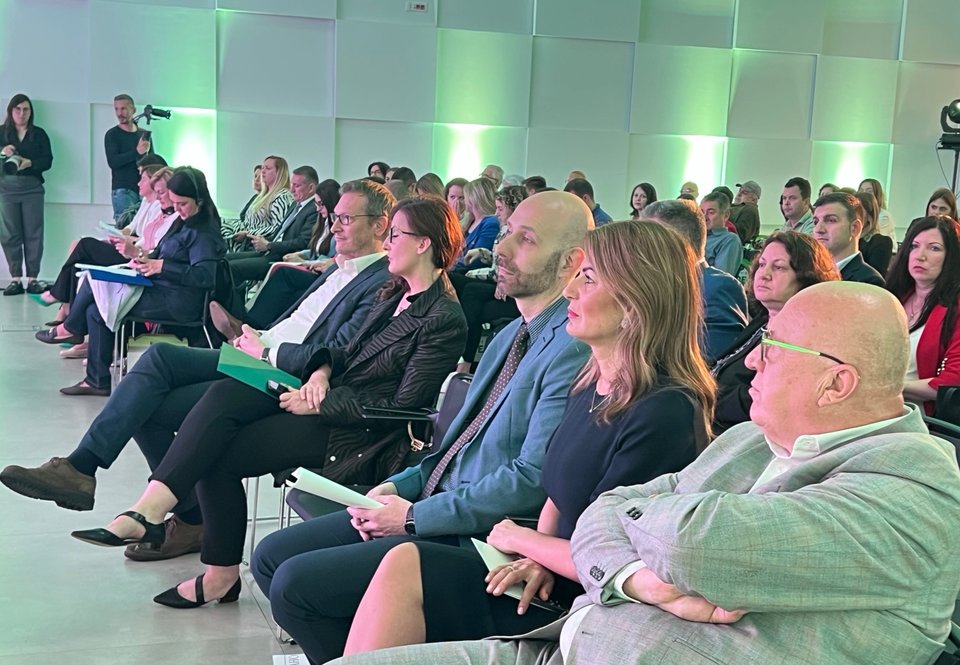Belgrade, June 22, 2023 - With the support of the "EU for Green Agenda in Serbia" project, the Western Balkans Circular Economy Summit was held at the Serbian Chamber of Commerce. This event brought together key regional actors to assess the progress made in implementing the Green Agenda over the past three years. Considering that the economies in the region still heavily rely on traditional business models, the Summit highlighted the urgent need to shift from a linear to a circular economy.
The circular economy is a business model that aims to reduce waste, increase resource efficiency, and promote sustainable consumption and production. In contrast to the traditional linear model of "take-make-use-dispose," the circular economy focuses on prolonging the use of materials, extending product life, reusing or recycling items, and reducing the consumption of limited natural resources.
During the event, Ivana Hadži Stošić, the State Secretary of the Ministry of Environmental Protection, emphasized that the circular economy is recognized as a significant driver for Serbia's green transition. "The green transition involves economic, energy, and investment transformations based on sustainable energy use, minimizing negative environmental impact, utilizing innovative digital tools, and enhancing economic competitiveness", explained Hadži Stošić. She also noted that Serbia, along with the rest of the world, committed to sustainable development and climate change mitigation with the adoption of the UN Agenda 2030 and the Paris Agreement in 2015.

Over the past seven years, the United Nations Development Program (UNDP) has supported more than 30 innovative ideas to accelerate the circular economy. Additionally, more than 60 companies interested in waste recycling and reuse have participated in circular economy challenges conducted in the first half of this year. Miroslav Tadić, the Team Leader for Climate Change and Environment at UNDP, stated at the Summit that the new EU policy, the Green Deal, aims for climate neutrality, sustainable energy sources, zero waste, and a circular economy.
"This policy has been mirrored in the Sofia Declaration for the Green Agenda, and it has been extended to the countries of the Western Balkans. Serbia has already taken significant steps towards it, including the implementation of the Circular Economy Program, the Low Carbon Development Strategy, and the adoption of regulations for greenhouse gas emissions (GHG). Furthermore, improvements are being made to the regulations on waste and by-products, and the adoption of the National Energy and Climate Plan is expected, along with challenges related to the EU border tax on carbon emissions. These developments are clear indications that a heavy reliance on fossil fuels and linear business models are no longer viable options. Instead, decarbonization and the transition to a circular economy are necessary for competitiveness and survival in the market," said Tadić.
The Chapter 27 Desk Officer at the EU Delegation to Serbia Antoine Avignon highlights the urgent need for a shift towards a circular economy, citing recent climate change-related incidents such as floods, low underground water levels, and forest fires.
“The circular economy aims to minimize waste generation and maximize resource efficiency. The Western Balkans region, with its high dependence on fossil fuels and limited advancements in renewable energy, should prioritize circular practices to meet global greenhouse gas emissions reduction targets” said Avignon and emphasized the multiple benefits of circular economy implementation, including environmental preservation, economic growth, and enhanced competitiveness in the Western Balkans.
The Western Balkans Circular Economy Summit comprised four panels, which reviewed the application of the Green Agenda from the perspectives of competent state authorities, international institutions, and chambers of commerce. The panels also presented circular solutions implemented by companies in their operations and explored potential sources of financing for the green transition. It was emphasized that the world still has a long way to go in achieving the desired changes, especially considering the data from the Circularity Gap Report 2023, which indicates that only 7.2 percent of the global economy is circular.
As a side event of the Summit, the Circular Economy Festival took place at Cvetni Trg in Belgrade. The Festival featured various fun and educational activities for children and citizens, aiming to raise awareness about the climate crisis and the importance of applying circular economy principles in preserving natural resources.
The project "EU for Green Agenda in Serbia", with the technical and financial support of the European Union and in partnership with the Ministry of Environmental Protection, is implemented by UNDP in cooperation with the Embassy of Sweden and the European Investment Bank (EIB), with additional funding from the Governments of Sweden, Switzerland and Serbia.